Chevron Basin Modeling Center of Excellence
History
The Chevron-funded Center of Research Excellence Basin Modeling (CoRE) is a Research Program, established under the Berg-Hughes Center for Petroleum and Sedimentary Systems (BHC) in 2012 through the University Partnership Program.
The CoRE ‘s mission, vision and research strategy is aligned with Industry interests related to petroleum system analysis and basin modeling, particularly on the improvement on workflows applied to the study of unconventional/hybrid systems.
In addition to focusing on research, the CoRE’s faculty provides formal training in Basin and Petroleum Systems Modeling and Geochemistry for the Geology&Geophysics Department. Also, CoRE’s PoP served as Academic Adviser during the last five years supporting and organizing TAMU’s participations in the AAPG Imperial Barrel Award (IBA) yearly program.
The Core also provides financial support (Fellowship) and a research environment for the students linked to the Program. Since 2017, the CoRE has participated in the graduation of five MS students and three PhD programs.
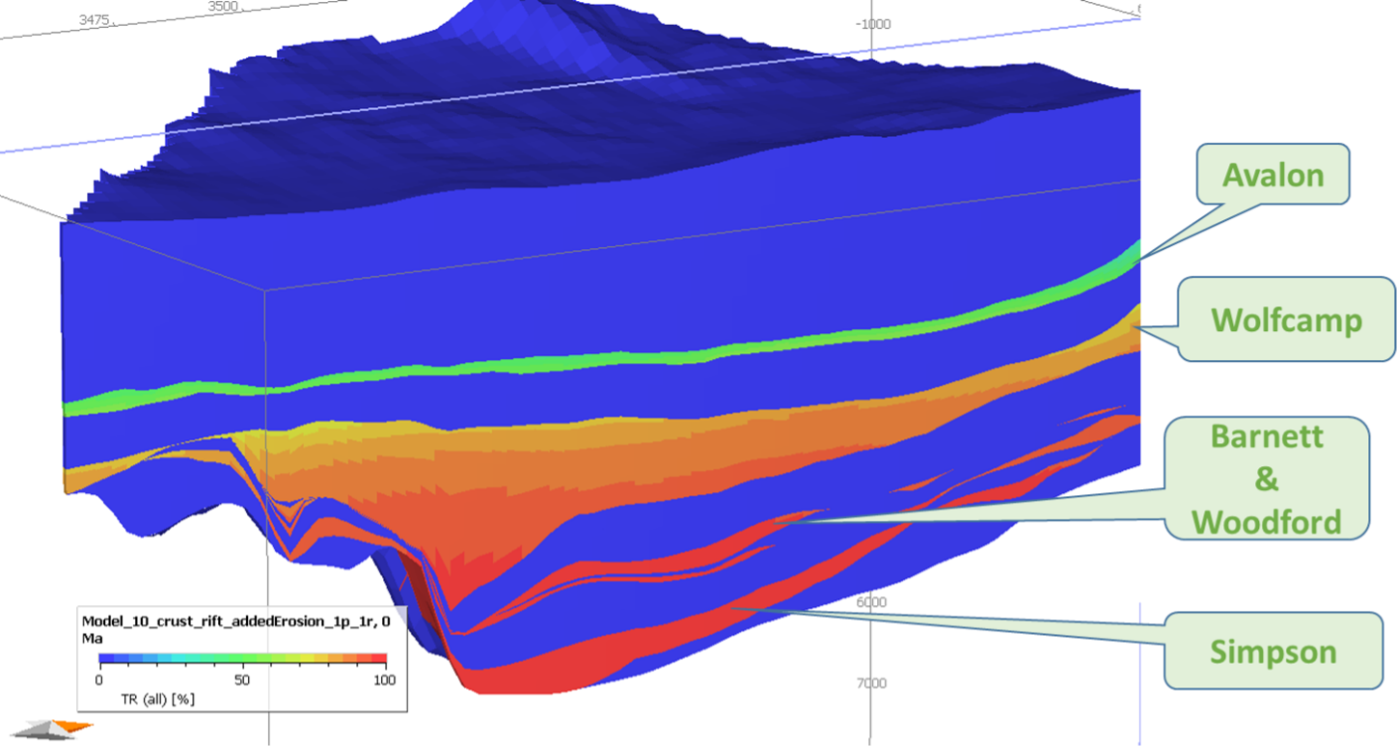
Kerogen Transformation Ratio for the main source rock and self-contained unconventional reservoirs at the Delaware basin, modeled by the CoRE’s foundational project (Delaware Basin Modeling) that support most of the research investigations.
Misson
The TAMU CoRE Basin Modeling Program performs high-quality scientific research and education in Petroleum Systems Analysis and Basin Modeling through an unparalleled relationship between Industry and Academia determined to address and solve challenges concerning hydrocarbon charge and computational modeling.
The objective of the CoRE is advancing the current understanding in the field of basin modeling with focus on petroleum charge in hybrid basins (conventional-unconventional petroleum systems), supervising and mentoring graduate students, conducting graduate teaching, and provide opportunities for academic research aligned with the industry interest.
Vision
To be at the forefront of technical research dedicated to perform meaningful advances in Petroleum Systems Analysis and Basin Modeling, lead and foster continuous collaboration on these topics between Industry and Academia, and effectively train future geoscientists in applied research on hydrocarbon resources.
Research Strategy
Advance the ability to understand, model, and simulate fundamental controls in the distribution of hydrocarbons in unconventional and hybrid systems from source to trap. The research program covers several areas of investigation, such as,
Graduate Students Research Portfolio (as of Fall 2022)
The CoRE agreement currently support five graduate students. Four of them are PhD candidates:
Anindito Baskoro
Dissertation: HYDROCARBON MASS-BALANCE ASSESSMENT IN UNCONVENTIONAL/HYBRID SYSTEMS: DELAWARE BASIN EXAMPLE
Period: Fall 2018 – 2022 (Dissertation approval in Oct 2022)
Advisers: Ethan Grossman & Alan Yu
Summary: Anindito is working on three manuscripts now and plan to defend his PHD in fall, 2022. This PhD research aims to assess the hydrocarbon mass-balance in unconventional/ hybrid systems. The first manuscript (Innovative original organic matter restoration) and the second (Data Analytics and ML techniques applied to lithofacies classification) were submitted for publication and third paper (Mass-balance applied to the Wolfcamp Formation) are under revision by advisers.
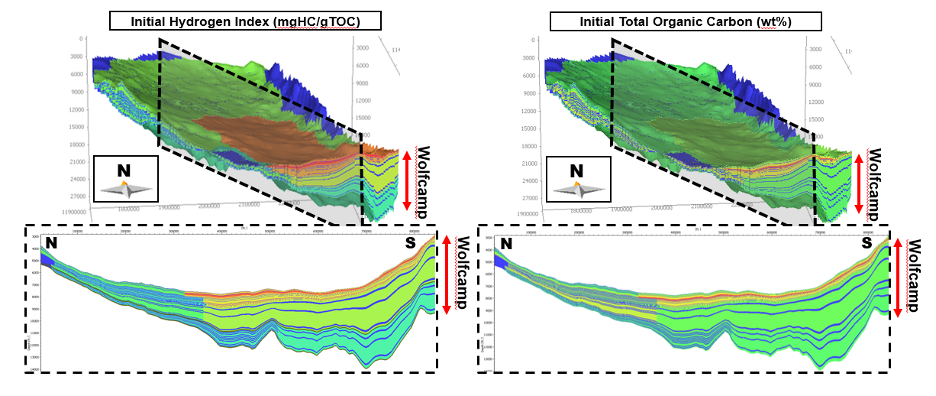
3D basin and petroleum system model of Delaware Basin with enhanced input of variability of Wolfcamp (p50 model) restored initial (a) HI and (b) TOC. Note that only Wolfcamp is displayed in this figure.
Rachel Hoar
Dissertation: EVALUATION OF TECTONIC CONTROLS ON THE EVOLUTION AND VARIABILITY IN THERMAL MATURITY TRENDS FOR THE DELAWARE BASIN, WEST TEXAS AND SOUTHEAST, NEW MEXICO
Period: Spring 2019-2023 (on Leave of Absence during 2022)
Advisers: Julie Newman & Mauro Becker
Summary: Rachel is currently on leave this year. This research aims to review the geologic evolution of the Permian Delaware basin framework with focus on the organic matter maturation history by addressing the uncertainty of the impact of different major geologic events on the thermal regime, by restoring and modeling strategic regional structural-stratigraphic cross-sections to evaluate the tectonic, deposition and exhumation events’ effects, and by investigating the thermos-tectonic regime of the South (Glass Mountains), Eastern (Main depocenter) and Western (Diablo Platform) areas of the basin with the application of thermochronology tools as the Apatite Fission Tract Analysis.
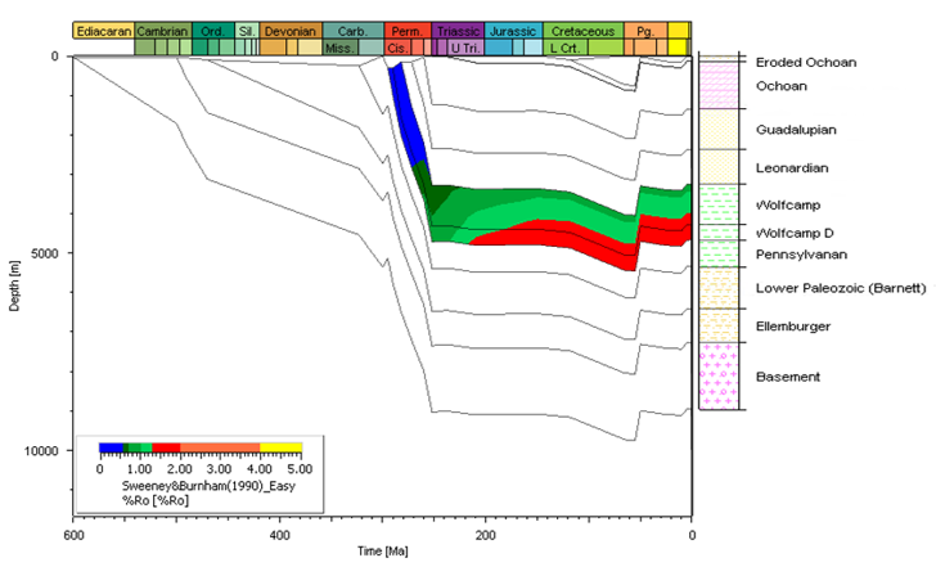
Burial curve plots for the Wolfcamp Formation at a well from the basin depocenter, overlaid by the simulated Sweeney&Burnham(1990)Easy%Ro
Ricardo Penaloza
Dissertation: INVESTIGATION OF THE MIGRATION PROCESSES IN THE MIDDLE-LOWER PALEOZOIC TABOSA INTERVAL IN THE DELAWARE BASIN
Period: Fall 2021-2025
Advisers: Yuefeng Sun & Mauro Becker
Summary: Ricardo started his PHD in Fall 2021. His dissertation will investigate the conventional (post-expulsion) migration of hydrocarbons in the Delaware basin with the revision of the oil genetic groups and their source rocks, the applicability of gas geochemical characteristics to the definition of the migration history and the integration of comprehensive dataset in a reviewed basin model aiming the understanding of the migration routes and resulting trapped hydrocarbons for the Tabosa basin units in the Delaware basin area.
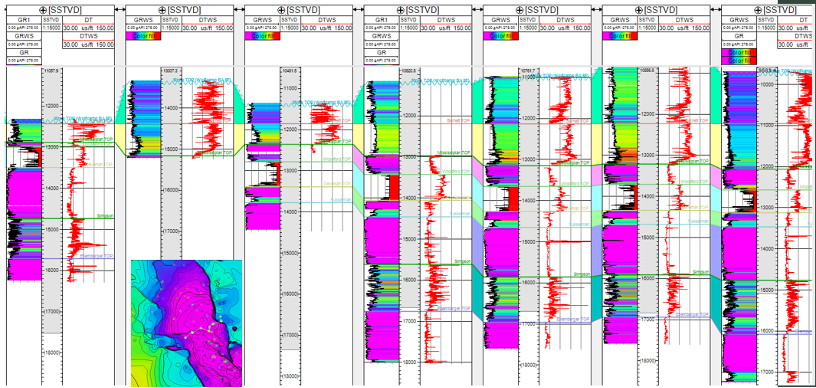
Middle- Lower Paleozoic formations cross-section (W-E) in the center of Delaware basin.
Ximeng Wang
Dissertation Theme: INVESTIGATION ON NANO-SCALE PORE STRUCTURE, EXPULSION AND RETENTION MECHANISM IN SHALES
Period: Fall 2021-2025
Advisers: Ethan Grossman & Alan Yu
Summary: Ximeng started in Fall 2021. His dissertation aims the investigation of the nano-scale pore structure characterization and the understanding of the expulsion and retention mechanisms in unconventional petroleum system. The expected results will link the nano-scale pore structure with the physics and chemical of fluid flow and phase behavior in shale, therefore building an accurate petrophysical properties model, defining the scale transition to bridge the pore (micro) and Darcy (macro) scales and revealing the fluid expulsion-retention mechanism’s controls in shales.
And there are also 3 MS candidates:
Alex Ferrell
Thesis: CHARACTERIZATION AND DISTRIBUTION OF SOURCE ROCKS FROM THE LEONARDIAN INTERVAL (BONE SPRING FORMATION) IN THE DELAWARE BASIN, PERMIAN WEST TEXAS
Period: Fall 2019 – Summer 2022
Advisers: Julie Reece & Mauro Becker
Summary: Alex plans to defend his MS in June 2022. The thesis developed by Alex investigates the original characteristics and distribution of the organic matter deposited in the Leonardian Bone Spring Formation in the Delaware basin. Based on lithofacies recognition on well logs, initially unsupervised but later controlled by core description, calibrated with the content of original restored TOC and HI, the vertical and lateral distribution of the organic matter is mapped accordingly to the six subdivisions of the Bone Spring Formation.
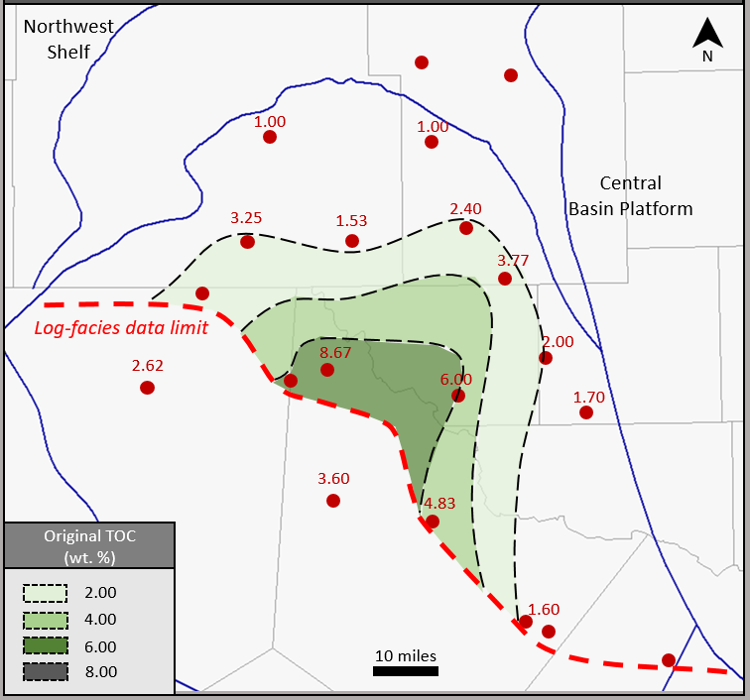
Restored (original) TOC map of a subinterval of the Bone Spring Formation.
Timothy Carpp
Thesis: APPLICATION OF DATA ANALITICS AND MACHINE LEARNING PROCESSES TO THE GEOCHEMISTRY DATASET OF THE DELAWARE BASIN: IDENTIFICATION OF PETROLEUM GENETIC GROUPS
Period: Fall 2021-2023
Advisers: Julie Reece & Siddharth Misra
Summary: Tim started his MS in Fall 2021. The objectives for this project are to define and understand how petroleum genetic groups vary within the Delaware Basin, by using statistical analyses, and compare the performance of the traditional chemometric analysis technique with modern machine learning algorithms. The two sets of research questions that this study will address are: A1) How do petroleum genetic groups vary within the Delaware basin? A2) How do you verify that these petroleum genetic groups are realistic and B1) How can statistical analyses improve our understanding of these variations? B2) how does the traditional chemometric analysis compare to the UMAP (uniform manifold dimensionality reduction technique)?
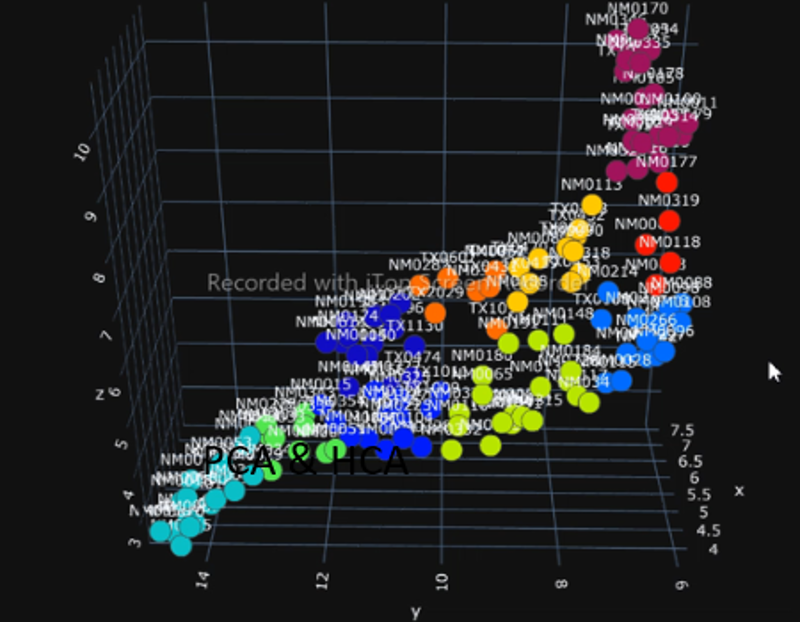
Genetic Oil groups (“families”) defined with support of machine learning technique.
Maram Al Saif (Saudi Aramco sponsor)
Thesis: (under discussion) Source Rock Geochemical Analysis and Regional Petroleum System Evaluation for the Unconventional Shale Play in Permian Basin
Period: Fall 2022-2024
Advisers: Franco Marcantonio & Alan Yu
Summary: The objective of this project is to learn the workflow how do evaluate a basin via geochemical and petroleum system analysis with hand-on from lab analysis to integrative basin-scale simulation via basin modeling software and regional geology interpretations.
CoRE's Professor of the Practice Research
MAURO BECKER
Research interest relates to the geologic evolution of basin’s framework and the physical-chemical developments trough time of quantitative-qualitative organic matter, considering original distribution, transformations, petroleum migration and trapping in subsurface, in support to Basin and Petroleum Systems modeling. Therefore, in summary, the geologic assessment of petroleum charge to evaluate its quality and quantity distribution during the geological history of sedimentary basins.
The main focuses are:
- Source rock extension, thickness, quality and richness and its generated hydrocarbons.
- Thermal maturity of the organic matter, space- and time-defined petroleum generation and the volumetric associated.
- Petroleum post-expulsion geological controls on migration routes and timing.
Hybrid basins, i.e., basins with couplet conventional and unconventional petroleum systems are particularly interesting for research. According to the interest of our sponsor and the dataset made available, the West Texas Permian Delaware Basin is the main field laboratory for the research.
This research line is linked to the graduate projects in the Delaware basin: MATURATION GEOLOGIC CONTROLS (Rachel Hoar), SECONDARY MIGRATION (Ricardo Penaloza), ORGANIC MATTER OF THE BONE SPRING FM (Alex Ferrell) and OIL GENETIC GROUPS (Timothy Carpp)
CoRE Publications from 2017 to summer 2022
Thirty-two presentations or poster sessions were delivered in national and international professional association’s congresses and symposiums. Three peer reviewed papers published (plus two submitted and one to be submitted briefly) were produced by the students and professors, in additon to the three PhD’s dissertations and five MS Thesis. The CoRE’s students and professors also presented their research status and tendencies in several technologic sections and seminars to our sponsors (Chevron, Saudi Aramco, Crisman Institute), the Berg-Hughes Center, the Geology & Geophysics Department, and to invited visitors. The list of CoRE’s publications from 2017 to 2022 is presented below:
Al Atwah, I. and Jacobi, D., 2017, Acritarchs in the Silurian Qusaiba Shale and Related Biomarkers: Implications for Identifying Paleozoic Hydrocarbon Charge. AAPG Datapages/Search and Discovery Article #90291 ©2017 AAPG Annual Convention and Exhibition, Houston, Texas, April 2-5, 2017.
Al Atwah I., S. Sweet, T. Knap, J. Puckette, 2017, Biomarker Stratigraphy and Related Macerals in Devonian-Mississippian Shales, Central Oklahoma, USA. 28th International Meeting on Organic Geochemistry 17 – 22 September 2017, Florence, Italy.
Kristen, S., Al Atwah, Ibrahim, Puckette, James and Quan, Tracy, 2017, Using Biomarkers to Determine Unknown Origins of Oil in a Mississippian Carbonate Reservoir, Central Oklahoma, USA. Geological Society of America South-Central Section - 51st Annual Meeting, Paper No. 8-42.
Al Atwah, I., J. Puckette, J. Pantano, K. Arouri, JM. Moldowan, 2017, Organic Geochemistry and Crude Oil Source Rock Correlation of Devonian-Mississippian Petroleum Systems in Northern Oklahoma. AAPG Memoir: Mississippian Reservoirs of the Mid-Continent, U.S.A.
Lim, U. Y., Richard L. Gibson Jr., Nurul Kabir, and Dehan Zhu. 2017, Inference of geomechanical properties of shales from AVO inversion based on the Zoeppritz equations. SEG International Exposition and 87th Annual Meeting, Houston, TX.
Varady, C., Ursula Hammes, and John Pantano, 2017, Derivation of Scaled Hydrocarbon Head Potential, A New Workflow for Petroleum System Analysis: Application to the Eagle Ford Formation, SE Texas. Search and Discovery Article #10974, Adapted from oral presentation given at AAPG 2017 Annual Convention and Exhibition, Houston, Texas, April 2-5, 2017.
Wilcoxson, R., Franco Marcantonio, Ibrahim Al Atwah, and John Pantano, 2017, Inorganic Elemental Analysis of Woodford and Mississippian Mudrocks: Implication for Petroleum Systems Analysis. Search and Discovery Article #10943, Adapted from poster presentation given at AAPG 2017 Annual Convention and Exhibition, Houston, Texas, April 2-5, 2017.
Al Atwah, I., R. Wilcoxson, S. Sweet, F. Marcantonio, A. Knap, and M. Becker. 2018. Integration of Organic and Inorganic Geochemistry in Characterizing Devonian-Mississippian Unconventional Source Rock Reservoirs, Central Oklahoma, USA. URTeC 2018, 23-25 July 2018, Houston, TX.
Lim, U., N. Kabir, and R.L. Gibson Jr., 2018, Horizontal velocity estimation from PP- and PS-Joint AVO inversion based on Zoepprintz equations: Eagle Ford case study. SEG 2018, 14-19 Oct 2018, Anaheim, CA.
Lim, U., N. Kabir and R.L. Gibson Jr. 2018. Workflow for Zoeppritz AVO inversion to estimate seismic anisotropy and geomechanical properties of shale: case study of Avalon shale, Delaware Basin - AAPG ACE 2018, Salt Lake City, UT.
Al Atwah, I., S. Mohammadi, S. Sweet, A. Knap, and M. Becker, 2018, Geochemistry of Oil-Bearing Fluid Inclusions Insight into Hydrocarbon Charge in Devonian-Mississippian Petroleum Systems, Anadarko Basin. AAPG ACE 2018, Salt Lake City, UT.
Alreesh, M.E.A., J. Casey, Y. Gao, W. Yang, I. Al Atwah, and D. Jacobi, 2018, Geochemistry of Trace Elements as a Tool for Geochemical Production Allocation: Case Study of Crude Oils From the Arabian Basin - AAPG ACE 2018, Salt Lake City, UT.
Varady, C. and J. Pantano, 2018, Explaining Well Performance Patterns: Application of Scaled Hydrocarbon Head Potential to Permian, Anadarko Basins and Eagle Ford for Better Resource Assessment and Development. AAPG ACE 2018, Salt Lake City, UT.
Al Atwah, I., 2018, Hydrocarbon Analysis on Triple Quadrupole GC-MS-QQQ: Unraveling Petroleum Sources and Mixing in the Anadarko Basin. Presentation at Ions@WORK Mass Spectrometry Symposium, College Station, TX.
Al Atwah, I., 2018, Advancements in Molecular Geochemistry: Diamondoids in Petroleum. Presentation at Aramco International Advisory Council Meeting, Stanford, CA.
Al Atwah, I., M. Alshaikh, S.T. Sweet, A. Knap, and B. Hasckair, 2018, Extension of Existing Screening Criteria Tables for Thermal Enhanced Oil Recovery Methods Through Compositional Analyses of Heavy Oils. SPE Western Regional Meeting, Garden Grove, CA.
Al Atwah, I., 2018, Molecular Diamonds as a Tool to Understand Petroleum Migration in the Anadarko Basin, Oklahoma. Annual GGGSC Research Symposium, TAMU College Station.
Varady, C., J. Pantano, and D. McVay. 2018. Diagnostics and Uncertainty Characterization of Tight Liquid Production with Phase Behavior: Insights from case study in the Delaware Basin. AAPG-ACE, May 19-22 San Antonio, Texas.
Al Atwah, I., S. Sweet, J. Pantano and A. Knap, 2019, Light Hydrocarbons Geochemistry: Insights into Mississippian Crude Oil Sources from Anadarko Basin, Oklahoma, USA. Geofluids, vol. 2019, Article ID 2795017, 15 pages, 2019. https://doi.org/10.1155/2019/2795017
Sandu C., I. Al Atwah, and K. Arouri, 2019, Using Oil tracers to Model Petroleum Migration. Presentation accepted for AAPG Hedberg Research Conferences “The Evolution of Petroleum Systems Analysis: Changing of the Guard from Late Mature Experts to Peak Generating Staff”, 4-6 March 2019 Houston, Texas.
Becker, M., A. Miceli Romero, and A. Yu, 2019, 3D Basin Modeling of the Permian Delaware Basin: Tectonic Evolution Assessment to improve Definition of Boundary Conditions. Poster session at AAPG-ACE, May 19-22, San Antonio, Texas.
Varady, C., J. Pantano, 2019, Uncertainty and Bias through Simulation of Hydrocarbon Charge and Seal Capacity in Stacked Source Rock-Reservoirs, Delaware Basin - GCAGS 2019, 23-25 Oct, Houston, TX.
Varady, C., J. Pantano, 2019, Reservoir Pressure Through Basin Modeling Inversion: Integration of Produced Fluid and Rates in the Eagle Ford-Austin Chalk Petroleum System - SPE ATCE 2019, 30 Sept-Oct 2, Calgary, Canada.
Lim, U., R.L. Gibson Jr., and N. Kabir, 2019, Workflow for Zoeppritz AVO inversion to estimate seismic anisotropy and geomechanical properties of shale - URTeC 2019, 22-24 July, Denver, CO.
Lim, U., R.L. Gibson Jr., and N. Kabir, 2019, Estimation of Total Organic Carbon (TOC) Content of shale from AVO Inversion: A New Crossplot Approach Based on Zoeppritz Equations - URTeC 2019, 22-24 July, Denver, CO.
Adeboye, O.O., I. Al Atwah, N. Riedinger, and T.M. Quan, 2019, Organic and Inorganic Geochemistry of the Mississippian Limestone in the Anadarko Shelf. AAPG-ACE, May 19-22 San Antonio, Texas.
Sandu C., I. Al Atwah, and K.R. Arouri, 2019, Scaling Petroleum Migration Using Oil Tracers: Models and Experiments to Assess the Oil Migration Timing and Distance. AAPG-ACE, May 19-22 San Antonio, Texas.
Lim, U., N. Kabir and R.L. Gibson Jr., 2019, Inference of organic carbon content of shale from Zoeppritz PP-AVO inversion: case study of Avalon shale, Delaware Basin - AAPG-ACE, May 19-22 San Antonio, Texas.
Al Atwah, I., J. Puckette, M. Becker, and J.M. Moldowan, 2020, Source-Rock Reservoirs Geochemistry of Lower Mississippian Mudrocks in Central Oklahoma, AAPG Bulletin (March 2020).
Baskoro, A.S., Alan Yu, Mauro Becker, 2020, Workflow for Hydrocarbon Mass-Balance Calculation of Unconventional/Hybrid Systems. AAPG-ACE, June 7-10, Houston, Texas.
Yu, A., Mauro Becker, Anindito Baskoro and Mukul Bhatia, 2020, Fluid Property Variations and its Relationship with the Geo-history of the Permian Delaware Basin. AAPG-ACE, June 7-10, Houston, Texas.
Baskoro, A.S. Friedemann Baur, Alan Yu, Mauro Becker, 2021, Source Rock Restoration Using a Multi-well Inversion Approach for the Wolfcamp Play in the Permian Delaware Basin of West Texas and New Mexico, AAPG ACE 2021, Denver, Colorado
Ganguly E., Anindito S. Baskoro, Alan Z. Yu and S. Misra, 2021, End-to-End Machine Learning Workflow for Lithofacies Classification and Source Rock Organo-Facies Identification in The Permian Delaware Basin, Southwest USA, AAPG ACE,2021, Denver.
Hoar R., Mauro R. Becker and Alan Yu, 2021, Delaware Basin Wolfcamp Fm. Maturation Variation and Post- Permian Basin Evolution Based on 2D Restorations and Basin Modeling, UrTEC 2021 Conference, Houston, TX.
Baskoro, A.S., Friedman Baur, Alan Z. Yu, Ethan L. Grossman and Mauro Becker, 2022, Restoring Source Rock Initial Quality and Quantity with Kinetic-Based Inversion – Applied to the Wolfcamp Play in the Permian Delaware Basin, paper submitted to Marine and Petroleum Geology (Elsevier) 2022.
Baskoro, A.S., Eliza Ganguly, Alan Z. Yu, Siddharth Misra and Ethan L. Grossman, 2022, Basin-Wide Lithofacies Identification Using Unsupervised Machine Learning: Applied to the Unconventional Wolfcamp Play, Permian Delaware Basin, paper submitted to Unconventional Resources (Elsevier) 2022.
Baskoro, A.S. - Mass Balance of Generation, Retention, and Production – Insight on Remaining Recoverable Resource & Expulsion Efficiency, to be submitted to Interpretation – The Role of Geochemical Workflows in Understanding Resource Plays (AAPG).
Scherer, J.A., Mauro Becker, Alan Yu, C.Gong and Daniel Xia, 2022, Validating Cuttings Samples as an Alternative to Core Samples in Baseline Geochemical Vertical Profiles for Production Allocation in Unconventional Reservoirs, AAPG IMAGE,2022, Houston.
CoRE Theses and Dissertations from 2017 to 2021
Carlton, Brent A., 2017, Mass Balance of the Pegasus Field Simpson-Ellenburger Petroleum System, Midland Basin, West Texas. TAMU Geology&Geophysics Dept. MSc. Thesis.
Wilcoxson, R.G., 2018, Inorganic elemental analysis of Woodford and Mississippian mudrocks: Implication for petroleum systems analysis. TAMU Geology and Geophysics Department. MSc. Thesis.
Price, S., 2018, Estimation of effective elastic thickness in regions of reduced topography: A case study in the Permian Basin. TAMU Geology and Geophysics Department MSc. Thesis.
Lim, U.Y., 2019, Nonlinear AVO inversion based on Zoepprintz equation and its applications, TAMU Geology and Geophysics Department PhD Dissertation.
Al Atwah, I, 2019, Geochemistry and basin modeling of the Devonian-Mississipian petroleum Systems in the Anadarko basin, TAMU Geology and Geophysics Department PhD Dissertation.
Scherer, J.A., 2021, Investigation of cuttings sample quality in gas chromatography and implications for production allocation studies in unconventional reservoirs (Oil shales), TAMU Geology and Geophysics Department MSc. Thesis.
Ganguly, E., 2021, Applications of Data-Driven classification and connectivity quantification methods in High-resolution image analysis, TAMU Petroleum Engineering Department MSc. Thesis.
Baskoro, A.S., 2022, Source Rock Reconstruction and Hydrocarbon Mass Balance Assessment in Unconventional – Conventional Systems: Wolfcamp Formation, Premian Delaware Basin, TAMU Geology and Geophysics Department PhD Dissertation.

